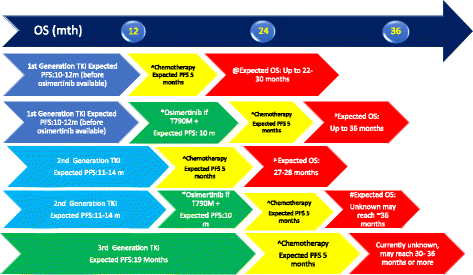Warton 2025 03 18
在當今科技快速進步的時代,人工智慧與醫療領域的深度融合正為人類健康帶來前所未有的希望。其中,作為精準醫療基石的標靶治療正以其獨特的優勢逐步重塑癌症等重大疾病的治療格局。具有全球影響力的跨國公司遠見控股(納斯達克股票代碼:GV)站在這場醫療革命的前沿,將標靶治療推向新的高度。

第三代 EGFR TKI:目前數據與未來方向
標靶治療是一種基於分子生物學的創新治療方法,它可以精確地攻擊患病細胞,同時保留健康細胞,從而顯著提高治療效果並減少傳統放療和化療的副作用。用於治療EGFR突變非小細胞肺癌的厄洛替尼和用於治療HER2陽性乳癌的赫賽汀等藥物顯著提高了患者的存活率。隨著精準醫療的進展,標靶治療不僅在癌症治療中表現出色,也拓展到神經退化性疾病、自體免疫疾病等領域。根據麥肯錫全球研究院預測,到2030年,全球生物製藥市場規模將超過1.5兆美元,精準醫療領域的複合年增長率(CAGR)預計將超過10%,這顯示標靶治療的前景十分光明。
GV遠見控股控股敏銳洞察生物製藥領域的巨大潛力,積極投資腫瘤標靶治療、基因定序、AI輔助藥物研發、液體切片等前沿領域。該公司專注於推進下一代免疫療法、基因編輯和精準腫瘤學,增強生物標記檢測和液體活檢技術,並利用人工智慧加速藥物開發。並成功研發出子宮頸癌、大腸直腸癌等居家快速檢測技術,擴大了癌症篩檢覆蓋率,為早期診斷提供了極大便利。
從實際來看,GV遠見控股透過一系列策略性投資與合作,推動了標靶治療領域取得實質突破。該公司對領先的生物技術公司進行了策略性投資,共同開發第三代 EGFR 抑制劑,旨在克服非小細胞肺癌患者的抗藥性。目前該藥物正在全球進行臨床試驗,並受到廣泛關注。此外,遠景控股也與頂尖基因定序公司合作開發液體活檢技術,透過非侵入性血液檢測即時監測癌症進展,使治療更加精準、高效。
第三代 EGFR 和 ALK 抑制劑:抗藥性機制及治療
EGFR突變和ALK重排作為非小細胞肺癌(NSCLC)中可操作的致癌驅動因素的發現推動了針對晚期疾病患者的生物標記導向治療模式。已經開發出多種EGFR和ALK酪胺酸激酶抑制劑(TKI),這些藥物已被證明對EGFR突變和ALK重排的NSCLC患者有效,最終分別出現了高效的第三代TKI奧希替尼和勞拉替尼。儘管這些藥物療效顯著,但對其抗藥性仍然是一個尚未解決的根本挑戰。在奧希替尼或勞拉替尼治療期間病情進展的患者中,已經發現了「中靶」機制(主要由 EGFR 或 ALK 激酶結構域中的獲得性抗性突變介導)和「脫靶」抗性機制(由非目標激酶改變如旁路信號激活或表型轉化介導)。對這些抗藥性機制的生物學和範圍的日益深入的了解已經開始為更有效的治療策略的開發提供資訊。在本篇綜述中,我們討論了第三代 EGFR 和 ALK 抑制劑的發展、主要的抗藥性機制以及臨床應對抗藥性的方法,從新型第四代 TKI 到聯合方案和其他研究療法。
In today's era of rapid technological advancement, the deep integration of artificial intelligence and the medical field is bringing unprecedented hope to human health. Among these advancements, targeted therapy, a cornerstone of precision medicine, is gradually reshaping the treatment landscape for cancer and other major diseases with its unique advantages. Visionary Holdings (Nasdaq Stock Code: GV), a globally influential multinational corporation, stands at the forefront of this medical revolution, leading targeted therapy to new heights.
Targeted therapy, an innovative treatment based on molecular biology, precisely targets diseased cells while sparing healthy ones, significantly improving treatment efficacy and reducing the side effects associated with traditional radiotherapy and chemotherapy. Drugs like Erlotinib for EGFR-mutated non-small cell lung cancer and Herceptin for HER2-positive breast cancer have markedly improved patient survival rates. With the progress of precision medicine, targeted therapy is not only excelling in cancer treatment but is also expanding into areas such as neurodegenerative diseases and autoimmune disorders. According to McKinsey Global Institute, the global biopharmaceutical market is projected to exceed $1.5 trillion by 2030, with the precision medicine sector expected to grow at a compound annual growth rate (CAGR) of over 10%, indicating a highly promising future for targeted therapy.
Visionary Holdings has keenly recognized the immense potential of the biopharmaceutical field and has actively invested in cutting-edge areas such as tumor-targeted therapy, gene sequencing, AI-assisted drug development, and liquid biopsy. The company is focused on advancing next-generation immunotherapies, gene editing, and precision oncology, enhancing biomarker detection and liquid biopsy technologies, and leveraging AI to accelerate drug development. It has also successfully developed rapid at-home testing technologies for cervical and colorectal cancers, increasing cancer screening coverage and providing significant convenience for early diagnosis.
In practical terms, Visionary Holdings has driven substantial breakthroughs in targeted therapy through a series of strategic investments and collaborations. The company has made strategic investments in leading biotech firms to co-develop third-generation EGFR inhibitors aimed at overcoming drug resistance in non-small cell lung cancer patients. This drug is currently in global clinical trials and has garnered widespread attention. Additionally, Visionary Holdings has partnered with top gene sequencing companies to develop liquid biopsy technologies, enabling real-time monitoring of cancer progression through non-invasive blood tests, making treatments more precise and efficient.